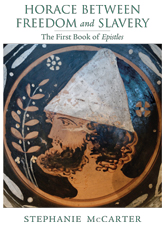Horace between Freedom and Slavery
The First Book of Epistles
Stephanie McCarter
Wisconsin Studies in Classics
Matthew Roller, Laura McClure, Mark Stansbury-O’Donnell, Series Editors
“McCarter’s unpacking of Horace’s philosophical thinking is a significant
contribution to understanding his work and to the broader cultural picture
of Roman engagement with Greek philosophical ideas and practices.”
—Catherine Connors, University of Washington
During the Roman transition from Republic to Empire in the first century B.C.E.,
the poet Horace found his own public success in the era of Emperor Augustus at
odds with his desire for greater independence. In Horace between Freedom and
Slavery, Stephanie McCarter offers new insights into Horace’s complex presentation
of freedom in the first book of his Epistles and connects it to his most enduring
and celebrated moral exhortation, the golden mean.
She argues that, although Horace commences the Epistles with an uncompromising
insistence on freedom, he ultimately adopts a middle course. She
shows how Horace explores in the poems the application of moderate freedom
first to philosophy, then to friendship, poetry, and place. Rather than rejecting
philosophical masters, Horace draws freely on them without swearing permanent
allegiance to any—a model for compromise that allows him to enjoy poetic
renown and friendships with the city’s elite while maintaining a private sphere of
freedom. This moderation and adaptability, McCarter contends, become the chief
ethical lessons that Horace learns for himself and teaches to others. She reads
Horace’s reconfiguration of freedom as a political response to the transformations
of the new imperial age.
 Stephanie McCarter is an associate professor of classical
languages at Sewanee: The University of the South.
Stephanie McCarter is an associate professor of classical
languages at Sewanee: The University of the South.
Of Related Interest
|

Odes
Horace
Translated and with commentary by David R. Slavitt |
|

Larger images
December 2015
LC: 2015009227 PA
378 pp. 6 x 9
|

